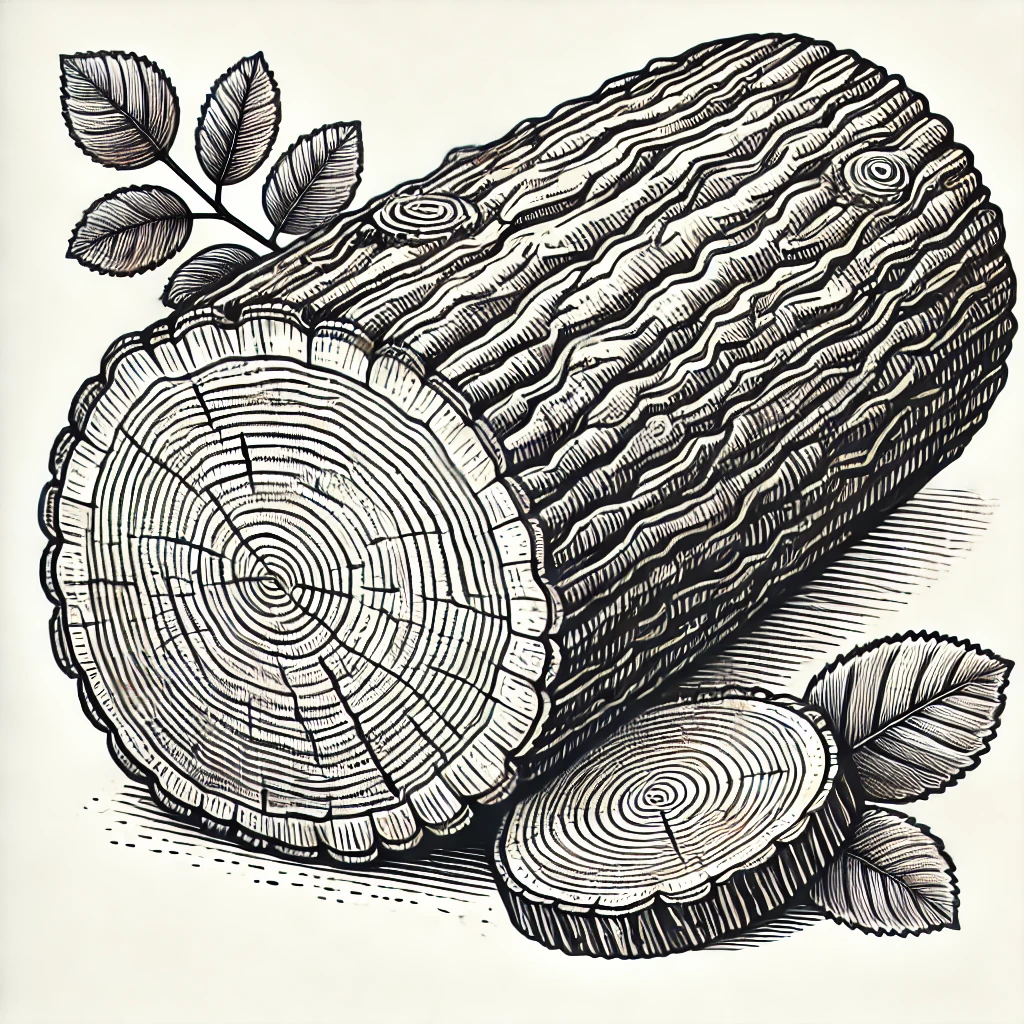Log
Definition
A part of the trunk or a large branch of a tree that has fallen or been cut off.
Parts of Speech
- Noun
- Verb
Pronunciation
American English
- IPA Pronunciation: /lɔːɡ/
- Respelling: LAWG (with "LAW" as in "saw" and "G" as in "go")
British English
- IPA Pronunciation: /lɒɡ/
- Respelling: LOG (with "LOG" as in "dog")
In both dialects, "log" places the primary stress on the entire word. The American pronunciation has a longer "aw" sound, while the British pronunciation has a shorter "o" sound.
Etymology
Originated from the Old Norse "lág", meaning "felled tree". The term has diversified in its application over time, especially with the advent of seafaring and later, computing.
Derivatives
- Logger
- Logging
- Logbook
- Logged
- Log-in
Synonyms
- Timber
- Trunk
- Record
Antonyms
- Erase
- Delete
- Void
Usage
Logs are commonly used in various contexts, from forestry to nautical navigation, and in modern times, in computing and project management for recording data and events.
- The lumberjack chopped the log into smaller pieces.
- She checked the log to see when the last system update occurred.
Related Terms
- Timber: Processed wood ready for use in construction.
- Diary: A personal record of events, thoughts, and observations.
- Database: An organized collection of data, generally stored and accessed electronically.
Detailed Definition
Noun
- Log (Noun): A part of the trunk or a large branch of a tree that has been cut or fallen off.
- Example: "They used a log to build the cabin."
- Log (Noun): A systematic record of events, observations, or measurements.
- Example: "The captain kept a detailed log of the ship’s journey."
Verb
- Log (Verb): To cut down trees and prepare them for transport.
- Example: "They logged the forest for timber."
- Log (Verb): To make an official record of events, observations, or measurements.
- Example: "The scientist logged the data from the experiment."
log

.png)

🇨🇳 Mandarin
- 木头 (Mùtou)
- IPA: [mù.tʰóu]
- Respell: Moo-tow
- 日志 (Rìzhì)
- IPA: [ɻɻ̩̀.ʈʂɻ̩̀]
- Respell: Ree-zhr
🇮🇳 Hindi
- लकड़ी का टुकड़ा (Lakṛī kā ṭukṛā)
- IPA: [ləkɽiː kaː ʈʊkɽaː]
- Respell: Luk-ree ka tuk-ra
- लॉग (Lŏg)
- IPA: [loːg]
- Respell: Log
🇪🇸 Spanish
- Tronco
- IPA: [ˈtɾoŋko]
- Respell: Tron-ko
- Registro
- IPA: [reˈxistɾo]
- Respell: Ray-hees-tro
🇫🇷 French
- Bûche
- IPA: [byʃ]
- Respell: Boosh
- Journal
- IPA: [ʒuʁnal]
- Respell: Zhoor-nal
🇸🇦 Modern Standard Arabic
- جذع (Jiḏ‘)
- IPA: [d͡ʒɪðʕ]
- Respell: Jidh'
- سجل (Sajal)
- IPA: [ˈsajjɪl]
- Respell: Sa-jil
🇧🇩 Bengali
- কাঠের গুঁড়ি (Kāṭher guṛi)
- IPA: [kaːʈʰer ɡuɽi]
- Respell: Ka-ther goo-ree
- লগ (Log)
- IPA: [log]
- Respell: Log
🇷🇺 Russian
- Бревно (Brevno)
- IPA: [ˈbrʲevnə]
- Respell: Brev-no
- Журнал (Zhurnal)
- IPA: [ʐʊrˈnal]
- Respell: Zhoor-nal
🇵🇹 Portuguese
- Tronco
- IPA: [ˈtɾõku]
- Respell: Tron-koo
- Registro
- IPA: [ʁɛʒisˈtɾu]
- Respell: Hez-hees-troo
🇮🇩 Indonesian
- Batang kayu
- IPA: [ˈbatʌŋ ˈkaju]
- Respell: Ba-tang ka-yoo
- Catatan
- IPA: [tʃaˈtatan]
- Respell: Cha-ta-tan
🇩🇪 German
- Holzklotz
- IPA: [ˈhɔlt͡sˌklɔt͡s]
- Respell: Holtz-klotz
- Protokoll
- IPA: [pʁotoˈkɔl]
- Respell: Pro-to-kol
🇯🇵 Japanese
- 丸太 (Maruta)
- IPA: [maɾɯta]
- Respell: Ma-ru-ta
- 記録 (Kiroku)
- IPA: [kiɾokɯ]
- Respell: Kee-ro-koo
🇻🇳 Vietnamese
- Khúc gỗ
- IPA: [kʰʊk˧˧ ɡoː˧˧]
- Respell: Khook go
- Nhật ký
- IPA: [ɲət˧˧ ki˧˧]
- Respell: Nyat kee
🇰🇷 Korean
- 통나무 (Tongnamu)
- IPA: [tʰoŋ.na.mu]
- Respell: Tong-na-moo
- 기록 (Girok)
- IPA: [ɡi.ɾok̚]
- Respell: Gee-rok
🇹🇷 Turkish
- Kütük
- IPA: [kyˈtyk]
- Respell: Koo-tyk
- Günlük
- IPA: [ɟynˈlyk]
- Respell: Gyun-lyuk
🇵🇰 Urdu
- لکڑی کا ٹکڑا (Lakṛī kā ṭukṛā)
- IPA: [ləkɽiː kaː ʈʊkɽaː]
- Respell: Luk-ree ka tuk-ra
- لاگ (Log)
- IPA: [log]
- Respell: Log





